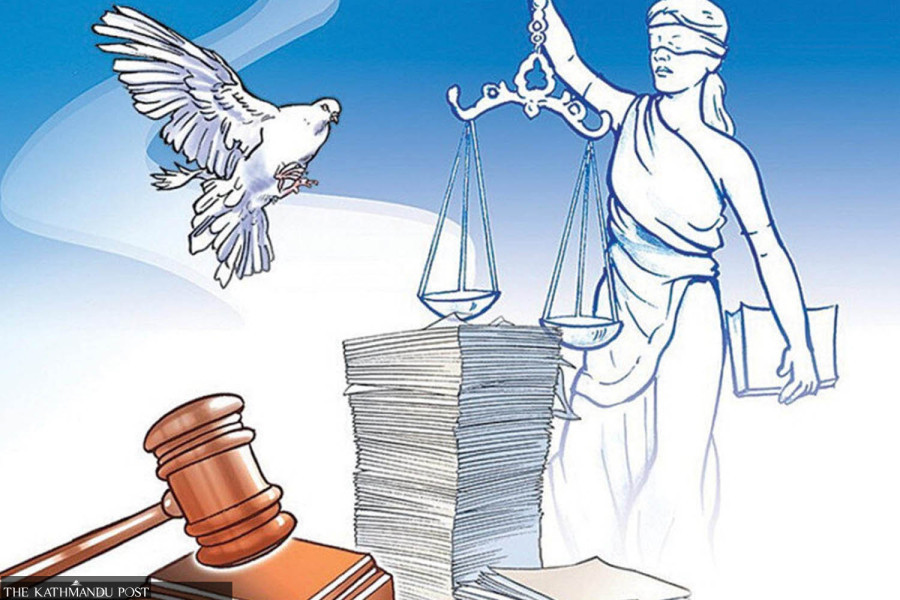National
110 seek positions in transitional justice commissions
Judges, rights activists and victims are among applicants.
Binod Ghimire
The committee formed to nominate office bearers to the two transitional justice commissions has received 110 applications from former judges, diplomats, professors, government secretaries, human rights activists and conflict victims.
Of them, 80 have applied individually while 16 organisations recommended the names of 30 others. “We have received applications from very competent and reputed personalities,” Lily Thapa, spokesperson for the recommendation committee, told the Post. “Their names will be published Monday.”
The Om Prakash Mishra-led panel on April 9 sought applications from aspirants to lead the Truth and Reconciliation Commission and the Commission of Investigation on Enforced Disappeared Persons with a 10-day deadline. The committee set three modalities for application.
While individual aspirants could directly apply for any of the positions, different human rights and victims’ organisations could also make recommendations at the organisational level. Such institutions, however, need to produce the evidence of consent from the individuals concerned.
Similarly, the recommendation committee can identify candidates on its own. The provision of organisational nominations and selection by the committee itself was included as renowned figures might hesitate to apply for positions in the commissions.
“After evaluating the applications, the committee can include a few names before publishing the shortlist,” said an official who has followed the process. The list of applicants recommended by victims’ organisations includes former chief justice Kalyan Shrestha, former assistant secretary-general of the United Nations Kul Chandra Gautam, professor Krishna Khanal, and Mandira Sharma, senior international legal advisor to the International Commission of Jurists, as chairs.
They have also recommended victims’ representatives including Suman Adhikari, Ram Bhandari, Sushila Chaudhary, and Srijana Shrestha, among others, as members. Senior advocates Dinesh Tripathi, Raju Chapagain and rights defenders Birendra Thapaliya, Rajan Kuikel, Tika Dhakal, Santosh Sigdel, and Laxmi Pokharel have been recommended as members.
Former high court acting chief judge Dilli Raj Acharya has applied for the position of chair while Binita Nepali, Srijana Pokharel, among others, have applied as members. Some former officer bearers of the two commissions including Gangadhar Adhikari, whose tenure were not extended for their failure to discharge the assigned duties, have also applied for reappointment.
The Mishra-led committee was formed by the KP Sharma Oli administration on March 24, after consultation with CPN (Maoist Centre) chair Pushpa Kamal Dahal, who is also the leader of the main opposition in the House of Representatives. The committee has until May 23 to do its job.
After reviewing the applicants’ resumes, the committee will publish a shortlist of candidates.
Those shortlisted will be interviewed and asked to give presentations. Finally, two chairpersons and eight members will be nominated for appointment, and the Cabinet will make the final appointments. The new teams will have four years to complete the investigation, find out the truth, and recommend reparations and prosecutions.
This is the second time in three months that the Mishra-led panel is shouldering the responsibility of picking office bearers for the truth and disappearance commissions.
After long negotiations among major parties, the federal parliament amended the Enforced Disappearances Enquiry Act in August 2024, more than nine years after the Supreme Court struck down a number of its controversial amnesty provisions. Two months later, the government on October 18 formed a five-member panel coordinated by Mishra to recommend names for the two chairpersons and eight members for the two commissions combined.
However, earlier, the Mishra-led panel failed to accomplish its job within the deadline following serious differences among its members over the proposed names. It exhausted its tenure in mid-December last year even as 156 persons including retired judges, legal experts and rights defenders, as well as the victims of the decade-long Maoist insurgency, had applied for the positions.
Victims’ groups have cautioned the recommendation committee to follow a transparent process with clear criteria for selection, based on qualifications, capacity, and experience, and recommend trustworthy officers.
“We also request that the committee consult the victim community and other stakeholders to carry out this national responsibility by listing those who have contributed to peacebuilding and human rights, with maximum competence,” the victims group said Saturday.
“The recommendation committee must not succumb to any external pressure or influence, and it should address the deep pain of the victims with a sense of national responsibility. We would like to remind the committee that we are ready to offer any support to ensure that a credible and transparent process is followed.”
The two commissions have been inactive since July 2022 after the government decided to extend their terms without retaining their chairpersons and members.
Formed in February 2015 to investigate insurgency-era crimes and atrocities, the truth commission has received 63,718 complaints. Similarly, the disappearances commission has around 2,500 complaints to investigate and find out the whereabouts of the people forcibly disappeared by the Maoists and the state security forces.




 30.12°C Kathmandu
30.12°C Kathmandu












